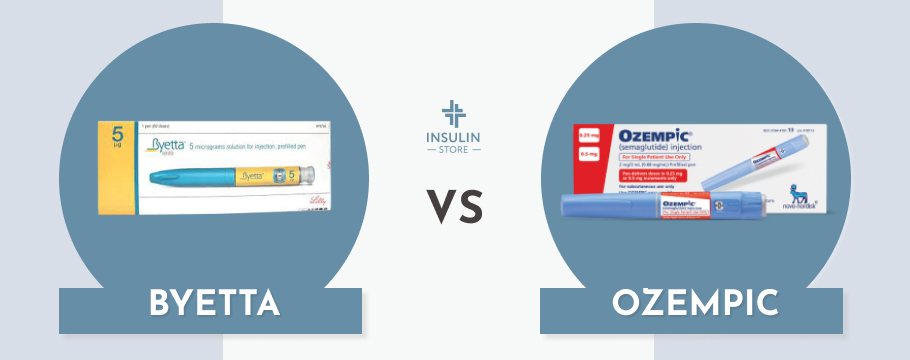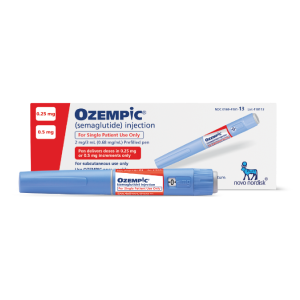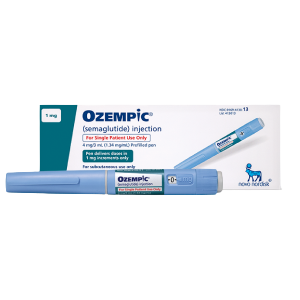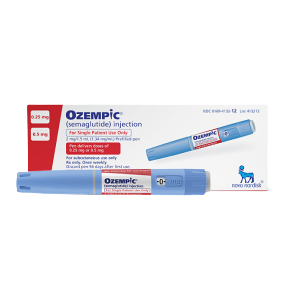
Byetta vs. Ozempic: Choosing the Best Option for Diabetes Management
Diabetes management often involves balancing medications, diet, and lifestyle to maintain stable blood sugar levels and support overall health. Injectable medications, such as Byetta and Ozempic, have emerged as effective options for improving glycemic control (or, in other words, normalising blood glucose levels) and achieving additional health benefits like weight loss.
However, choosing the right medication can be challenging. This article provides a comprehensive comparison of Byetta and Ozempic, helping you determine the best option for your diabetes management needs.
General Information About Low Blood Sugar and Weight Loss Medications
Managing type 2 diabetes through achieving average blood sugar levels often requires medications that not only regulate blood sugar but also address related health concerns like weight management. Injectable GLP-1 receptor agonists, including Byetta and Ozempic, have gained popularity for their dual benefits in glycemic control and weight loss.
Byetta
Byetta (exenatide) is a twice-daily injectable medication approved for managing type 2 diabetes. As a GLP-1 receptor agonist, it works by stimulating insulin production in response to meals, reducing glucose production by the liver, and slowing gastric emptying. This contributes to better control of blood sugar and may help with weight loss. Byetta is particularly suitable for individuals who need an option for postprandial (after-meal) glucose regulation.
Byetta has been available for many years and is often prescribed for individuals who need immediate intervention in their blood sugar management. It’s an effective option for patients who have not responded well to oral medications or require additional support to meet their glucose targets.
Ozempic
Ozempic (semaglutide) is a once-weekly injectable medication also belonging to the GLP-1 receptor agonist class. It enhances insulin secretion, suppresses glucagon release, and slows digestion to promote better glycemic control. Additionally, Ozempic has demonstrated significant weight loss benefits, making it an attractive choice for people who need both blood sugar management and weight reduction.
Ozempic’s extended-release formulation allows patients to maintain consistent blood sugar levels throughout the week, reducing the likelihood of glycemic fluctuations. Its weight loss benefits have also made it a popular choice among healthcare providers, especially for individuals with obesity-related complications.
Other Medications
Other medications with similar efficacy (both FDA-approved and off-label) include Trulicity (dulaglutide), Victoza (liraglutide), Bydureon (extended-release exenatide), and so on. Each of these medications offers unique features, such as dosing frequency and weight loss potential, allowing for personalized diabetes management plans.
Trulicity, like Ozempic, is a once-weekly option that combines convenience with efficacy, while Victoza offers daily dosing and is often chosen for its cardiovascular benefits. Bydureon provides an alternative for those who prefer a weekly injection but might benefit from exenatide rather than semaglutide.
Main Differences Between Byetta and Ozempic
When comparing Byetta and Ozempic, understanding their differences is crucial for making an informed decision. Below are ten key distinctions.
| Feature | Byetta | Ozempic |
|---|---|---|
| Generic Name | Exenatide | Semaglutide |
| Type of Drug | GLP-1 receptor agonist | GLP-1 receptor agonist |
| Administration | Twice daily injection | Once weekly injection |
| Indications | Type 2 diabetes | Type 2 diabetes, weight management (off-label) |
| Common Side Effects | Nausea, vomiting, diarrhea | Nausea, vomiting, constipation |
| Storage | Refrigerated (36°F to 46°F) | Refrigerated (36°F to 46°F) |
| Cost | Moderate | $435 at Insulin.store |
1. Dosing Frequency
Byetta requires twice-daily injections, typically administered before breakfast and dinner. In contrast, Ozempic is a once-weekly injection, offering greater convenience for those with busy lifestyles. The reduced dosing frequency of Ozempic minimizes interruptions to daily routines and simplifies adherence to treatment.
2. Active Ingredient
Byetta contains exenatide, while Ozempic contains semaglutide. These active ingredients belong to the same GLP-1 receptor agonist class but differ slightly in their pharmacological effects and duration of action. Exenatide’s shorter half-life necessitates more frequent dosing, while semaglutide’s longer half-life supports weekly administration.
3. Weight Loss Potential
While both Byetta and Ozempic support weight loss (especially when combined with a balanced diet, physical activity, and other healthy lifestyle changes), clinical studies suggest that Ozempic, compared to Byetta, may lead to more significant weight reduction. This makes Ozempic an appealing choice for individuals prioritising weight management. Patients using Ozempic often report a sense of satiety, reducing overall calorie intake and promoting sustainable weight loss (it all happens since the medication effectively reduces appetite).
4. Effectiveness in A1C Reduction
Ozempic has shown superior proven efficacy in lowering hemoglobin A1C levels, a key marker of long-term blood sugar control. Byetta is effective but may not achieve the same degree of A1C reduction as Ozempic. This difference can be critical for individuals with higher baseline A1C levels seeking rapid improvement.
5. Side Effects
Both medications may cause gastrointestinal side effects such as nausea, vomiting, and diarrhea while used to lower blood sugar levels. However, Byetta users may experience these common side effects more frequently due to its shorter duration of action. Ozempic’s slower absorption may lead to fewer acute side effects, improving tolerability for sensitive individuals.
In addition to gastrointestinal effects, some users of Byetta GLP-1 agonists have reported injection-site reactions and skin complications after subcutaneous injections. These localized reactions are less common with Ozempic due to its less frequent dosing schedule.
6. Administration Timing
For diabetes control, Byetta must be injected within an hour before food intake, making its administration more time-sensitive. Ozempic offers greater flexibility as it can be injected at any time of day, regardless of meals. This flexibility reduces the risk of missed doses and enhances overall treatment adherence.
7. Impact on Cardiovascular Health
Ozempic has demonstrated cardiovascular benefits, including reduced risks of major adverse cardiovascular events in people with type 2 diabetes and cardiovascular disease. Byetta does not have the same level of evidence supporting cardiovascular protection. For patients with a history of heart disease, Ozempic’s cardioprotective effects can be a deciding factor.
8. Duration of Action
Byetta has a shorter duration of action, requiring multiple daily doses to maintain efficacy. Ozempic’s once-weekly dosing reflects its extended duration of action, providing more consistent blood sugar control. This consistency is particularly valuable for individuals with fluctuating glucose levels.
9. Cost and Insurance Coverage
Ozempic is often more expensive than Byetta, although insurance coverage may vary. Patients should consider their budget and insurance plan when choosing between the two medications. Financial assistance programs may also be available to offset costs for eligible individuals.
10. Pen Device Design
Ozempic pens are designed for weekly use and may be more user-friendly for some patients. Byetta pens, which require twice-daily injections, may require more frequent handling and needle changes. The ergonomic design of Ozempic pens makes them accessible for individuals with limited dexterity or vision impairments.
Additional Considerations
When choosing between Byetta and Ozempic, it’s important to consider other factors such as lifestyle, personal preferences, and overall health goals. For example, individuals with unpredictable schedules might find Ozempic’s weekly dosing more practical, while those needing immediate post-meal glucose control may benefit more from Byetta.
Additionally, discussing potential drug interactions with a healthcare provider is crucial. Both medications can interact with other treatments, and understanding these interactions can help optimize safety and effectiveness.
Key Takeaways
Byetta and Ozempic both offer effective solutions for managing type 2 diabetes, but their differences make them suited to different needs. Byetta’s twice-daily dosing and focus on postprandial glucose control may benefit those who need targeted meal-time management. Meanwhile, Ozempic’s once-weekly dosing, significant weight loss potential, and cardiovascular benefits make it a comprehensive choice for many patients.
Ultimately, the best choice of the best medicine depends on your individual health needs, weight-loss goals, lifestyle, and budget. Consulting your healthcare provider is essential to finding the right medication for your diabetes management plan. If you’re ready to take the next step, visit Insulin.Store to order Ozempic, Byetta, and other type-1 diabetes and type-2 diabetes medications with ease and confidence.
Byetta and Ozempic belong to prescription-based medications used to control blood sugar levels (and oftentimes lose weight as an additional effect). For this reason, you would need to have a valid prescription from a certified healthcare provider to order them online. As clinical trials show, unprescribed use of the medications might cause serious side effects (including heart attack and other medical conditions). So, please make sure to adhere to your prescription properly and responsibly.


